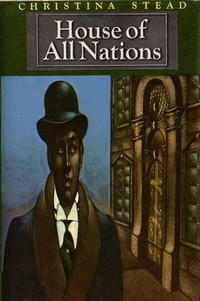Excerpt

The only political shadows were the first great Japanese attack on Manchuria and the terrifying rise of Hitlerism in the May, 1932, elections. All those who had been depending on German Social-Democracy, and on a return to liberalism or monarchy financed by Germany’s creditor states, were bitterly disappointed; at this moment the wing of terror spread its shadow over Europe, and the governing classes, in despair since 1929, began to see that Fascism was not simply an expedient to be used on a lackadaisical southern people, but a real salvation for their property. At this time the socialist friends of Alphendery began to tremble; the wisest predicted a hundred years of domination. Jules even became captious and cruel and couldn’t bear Alphendery to mention socialism or to wish the comfort of it all….
“If the stock exchange is abolished,” said Jules, “men like me will always set up a black bourse: it will come back. What you dream of are opium-den dreams, and besides you’re wasting time … You can make money … That’s what I want you to do … none of yur communist friends has ever made money, and so what brains have they? Forget them. You’re working for me!”
Alphendery laughed with contempt. “Jules, don’t worry. You’ve got time. There are plenty of tricks they can and will pull yet: every measure designed not for economic recovery but to put up the market, as if that were the first reality of economics, not merely the mercury of the middle classes…. This is the period of effrontery of capitalism and you think right, Jules, you’ve got the general line!”
“Yes,” said Jules, cooling. “I know it won’t last long, and I won’t last long; my three sons will be engineers, don’t fret! This is the day of the short-play heroes. No more Rhodes and houses of Rothschild!”
Comments from Michael Upchurch’s essay in Rereadings , edited by Anne Fadiman
, edited by Anne Fadiman
“It was an odd sensation, more than two decades after first encountering House of All Nations, to look again at a book that had shaped me in such serious and absurd ways, for it unerringly revealed how much one can’t know, or can’t remember, about one’s own reading and writing.
“In House of All Nations, it is this very lack of judgment that in collusion with her giddy, caustic humor, allows Stead to probe so deeply. The book may feel like an indictment, but it’s not an indictment of particular characters–it’s an indictment of a society in economic anarchy that is heading inexorably toward war. Her characters, as they see it, are just making the best of a bad hand….
“A second reading confirms how well assembled the book is, how deftly Stead juggles her vast cast and her many narrative strands, and how clearly she keeps a subplot’s pivotal details before the reader over a stretch of five hundred pages or more. A second reading also reveals a vein of the book that somehow escaped my notice the first time around, or else had faded from memory: the finely shaded and loving tribute it pays to European and Levantine Jewry. … More than half the main characters in House are Jewish, and they compose a rich mosaic of personalities and types–some rascally, some generous, some observers of their faith, others ebulliently cynical.
“Everywhere there is a sense that an intrinsic part of European character is being squeezed into an impossible corner. Stead had no way of imagining the particulars of the death-camp horrors in store. Yet she, like her characters, sensed something awful, just over the horizon, with a conviction approaching clairvoyance….
“Clearly, House of All Nations does plenty of things I’ll never be able to do. For a start, it catches me up passionately in a subject matter that, on the surface, I have no interest in as a reader and no talent for as a writer. (Surely this is one definition of a great book.) It shows me that in the right hands, even the most unpromising topics–wheat shipments, letters of credit–can give rise to fictional wizardry.
“For the longest time, I have to admit, the book misled me. It was a holy grail, a talisman, a reference point, and I embraced it the same way I’ve stepped aboard the wrong train, eager to begin my journey but headed in the wrong direction. I remain in awe of House of All Nations, knowing I’m not likely to pull off anything like it.
“But after all, there’s no need; it’s already been done.”

1 thought on “House of All Nations, by Christina Stead”